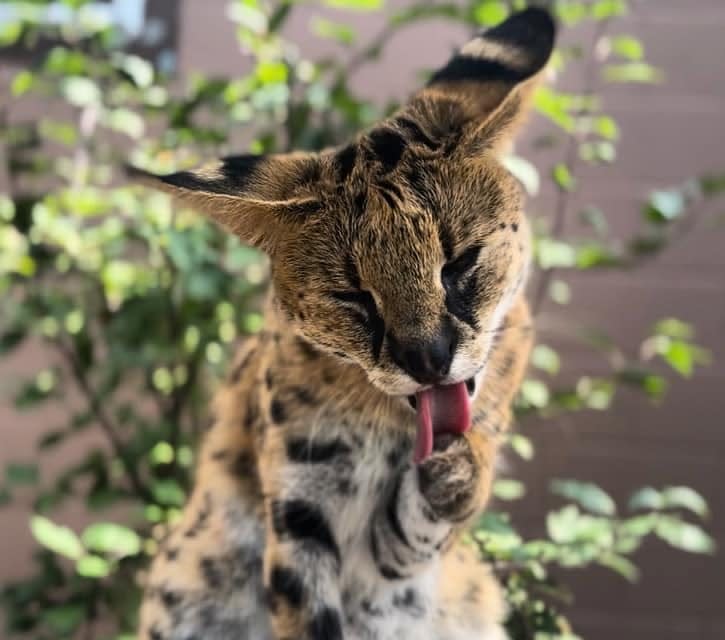Roger Williams Park Zoo hustles to raise money and build home for new arrival
African servals have a reputation for quickness, so it might come as no surprise that Roger Williams Park Zoo got one of the cats well ahead of schedule.
Part of an emergency relocation, Velma's arrival was so sudden, the zoo had to launch a special $346,000 fundraising campaign to start building her a home.
"Velma recently came to the zoo after the emergency relocation of more than 75 felines from a distressed private breeding facility in California," the zoo said in a Facebook post.
"Servals are a part of the zoo's 20-year plan, however, Velma arrived earlier than anticipated. With capital projects already allocated in the budget for the year, the zoo decided to raise emergency funds to build her home," the zoo said.

What's a serval?
Striking in appearance, servals were featured in Ancient Egyptian artwork and even kept by Egyptians as exotic pets. Described by the San Diego Zoo Wildlife Alliance as "super sleek," servals are medium-sized cats with long, slender legs, lean bodies, short tails and small heads. "Their extra-long neck and legs give them the nickname 'giraffe cat,'" the alliance says. There are only about 150 in U.S. zoos.
"They top out at 40 pounds yet have the largest ears of any cat," the alliance says. "Just how big are those ears? If we had ears in the same proportion to our head as servals do, they would be the size of dinner plates!"
More: Roger Williams Park Zoo's new baby is cute – but he won't win any races
Excellent hunters with a 90% success rate, they can leap more than 9 feet in the air to snatch birds, and they also stalk and eat rodents, reptiles, frogs, crabs and large insects. Their long necks help them peer above African savanna grasses to spot prey, while their tawny coats help them blend in.
"These cats' spotted coats are sometimes marketed as young leopards or cheetahs and can attract a hearty price on the black market," says the African Wildlife Foundation. "This, as well as their tendency to attack poultry, makes them a target for hunters. Consequently, servals are no longer found in heavily populated areas."
Do they make good pets?
Just as in ancient Egypt, the exotic appearance and impressive athleticism of servals make them attractive as pets to some in the United States. But keeping them as pets is illegal in most states, including Rhode Island, and a bad idea in general because they're wild animals, tend to mark furniture, rugs and other household objects with their urine and don't do well in confined spaces, according to experts.
Some breeders cross servals with domestic cats to produce what are called Savannah cats, which also have wild tendencies and are illegal in Rhode Island. In 2017, a Savanna cat was taken into state custody after it went inside a Cranston home and attacked a domestic cat.
Rhode Island law requires all dogs, cats and ferrets to be vaccinated against rabies, and there's no USDA-licensed rabies vaccines for wild felines, such as servals, or hybrids, such as Savannah cats, according to Scott Marshall, state veterinarian.
More: High-flying escape artist macaws now the stars of the show at Roger Williams Park Zoo
"We commonly get questions about their legality in Rhode Island," Marshall said. "Since hybrids are crosses between domestic cats and wild cats, there is not a rabies vaccine that is licensed for use in these species, and as such they may not be kept as pets in Rhode Island."
How Roger Williams Zoo is preparing to showcase servals
The California facility where the zoo got Velma was not breeding servals as pets, but rather for zoos in the United States and overseas, according to Vicki Scharfberg, the zoo's director of marketing and public relations. The compound was breeding a wide variety of cats when financial problems forced its closure.
The Providence zoo had planned on bringing in servals, but not for at least two years, according to Scharfberg. The zoo has nearly completed its fundraising and hopes to have construction of its home "well under way" this winter.
The zoo is also working with the Association of Zoos and Aquariums to bring in a male companion for breeding. "Servals, like most cats, are solitary, though," Scharfberg said.
Hopefully, she said, the public will be able to see one or two servals next year.
This article originally appeared on The Providence Journal: Due to emergency, Providence zoo gets serval well ahead of plan

